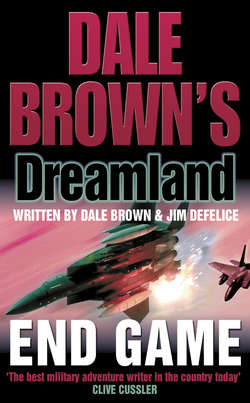Читать книгу End Game - Dale Brown - Страница 31
Southeastern Iran, near the coast 8 January 1998 1312
ОглавлениеCaptain Sattari’s knee, bruised in the recent action at Port Somalia, started to give way as he climbed from the back of the Mercedes. He grabbed hold of the door to steady himself, pretending to admire the splendor of the private villa three miles east of Chah Bahar on Iran’s southern coast. Being thirty-nine meant the little tweaks and twists took longer to get over.
The villa was something to admire; its white marble pillars harked back to the greatness of the Persian past, and its proud, colorful red tower stood in marked contrast to the dullness that had descended over much of the land in the wake of the mullahs’ extreme puritanism. Jaamsheed Pevars had bought the house before he became the country’s oil minister. He was one of the new upper class, a man who had earned his money under the black robes and thus owed them some allegiance. A decade before the small company he owned had won a contract to inspect oil tankers for safety violations before they entered Iranian waters. Inspection was mandatory, as was the thousand dollar fee, only half of which went to the government.
‘Captain?’ asked Sergeant Ibn, getting out from the other side.
‘Impressive view.’
Sattari shrugged off his knee’s complaints, and the men walked up the stone-chipped path that led to the front door. A servant met them, bowing with the proper respect before leading them through the portico out into a garden where his host was waiting.
‘Captain Sattari,’ said Jaamsheed Pevars, rising as they entered. ‘I greet you on your great success.’
As Sattari started to take his hand, he saw Pevars was not alone. The captain immediately stiffened; visitors generally meant trouble, usually from the imams who were constantly demanding more progress. But the man with his back to him was not one of the black robes. As he turned, Sattari was startled to see it was his father. Smiling broadly, General Mansour Sattari clasped the younger man to his chest.
‘Congratulations on your success,’ said the general.
‘Thank you, sir. Thank you.’
‘And Sergeant Ibn. How are you?’
‘Fine, General. Happy to see you.’
‘And I you. Are you watching over my son?’
‘The captain needs no one to oversee him.’
The general beamed. A servant came with sparkling water, setting down a large glass for the visitors.
‘A great success,’ Pevars said. ‘You have proven the concept. Now it is time to push the Indians further.’
‘We are prepared.’
‘Are you?’ said the oil minister. ‘There have been questions.’
‘Questions?’ said Sattari. He glanced at his father. Was that why he was here? Did the general doubt his own son?
‘Some of the black robes are demanding a return on the investment,’ said Pevars. ‘The price of oil has sunk so quickly lately that they are becoming concerned. The timetable –’
‘We’re completely ready.’
‘The sooner you can press the attacks and instigate the conflict, the better,’ added Pevars. ‘The commodities market shrugged off the attack.’
‘They will not be able to ignore the next one.’
‘My son is wondering why I am here,’ the general told Pevars. ‘And I should explain to him. Some of the imams in the council want to make sure the Indians are punished. And they want the war between the Indians and Pakistan to show that the Chinese cannot be trusted.’
‘I can’t guarantee a war,’ said Sattari. ‘The idea was to affect oil prices, not start a war. I have only a small force, four small aircraft and one large one, all primarily transports. I have one old ship, a hulk that just today we have covered with new paint. My four midget submarines are useful as transports but carry no weapons besides what a man can hold. I have thirty-six commandos. All brave men, all ready to die for Allah and Iran. That is the sum of my force.’
‘You were chased by the Americans,’ said his father.
‘Yes. They complicated our escape.’
The Americans were a great enemy of Sattari’s father. A year before, a small force of commandos and aircraft had attacked one of the general’s installations in the North, destroying a secret antiaircraft laser he had developed. The strike had lessened his influence in the government; naturally, he wanted revenge.
‘There was a rumor that you ran from them,’ said Pevars.
‘Who said that?’
‘One of the black robes,’ said his father.
So that was what this was about. Sattari guessed that the imam had a spy aboard the Mitra who had radioed back a report of the action before they reached port.
To be called a coward after the success of his mission! That was typical of those fellows. It was a favorite tactic, to tear down everyone else.
But did his father think he was a coward? That was an entirely different matter.
‘I did not run,’ Sattari said. ‘Exposing our force would have been idiocy. Worse than cowardice.’
‘I’m sure,’ said the general. ‘Do not let lies depress you.’
‘I won’t.’
‘Some sweets,’ said the oil minister. He clapped his hands for the servant.
